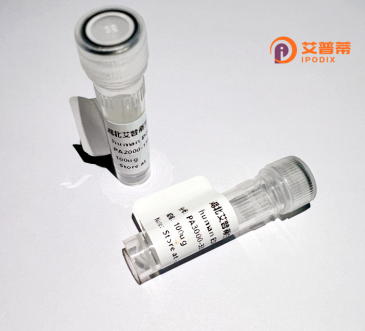
| 纯度 | >90%SDS-PAGE. |
| 种属 | Human |
| 靶点 | C5orf20 |
| Uniprot No | Q8TF63 |
| 内毒素 | < 0.01EU/μg |
| 表达宿主 | E.coli |
| 表达区间 | 1-244aa |
| 氨基酸序列 | MHYGAATHIQ NSRSHGLETV PGHQRLERGA GGETPEFPGC HSPAPPENFG NELLPLSAPL QGLSEGLYPP GRNKTLPAGV LREGAVQFLH RGLCNSNLSS EASARPSGTQ DELHSSRRKT GQTRREGARK HLVCSFRLYP FTVHTVSPGN SHLALYQVFK AVKLCPSETS FFLSRKSLKS SDPWHPPSLS PNSWNRQAGF RAWSSHLISL SLTCSDSQSR RVSSSQQPPL HSLSSHRRAA HVPE |
| 分子量 | 26.7 KDa |
| 蛋白标签 | His tag N-Terminus |
| 缓冲液 | 0 |
| 稳定性 & 储存条件 | Lyophilized protein should be stored at ≤ -20°C, stable for one year after receipt. Reconstituted protein solution can be stored at 2-8°C for 2-7 days. Aliquots of reconstituted samples are stable at ≤ -20°C for 3 months. |
| 复溶 | Always centrifuge tubes before opening.Do not mix by vortex or pipetting. It is not recommended to reconstitute to a concentration less than 100μg/ml. Dissolve the lyophilized protein in distilled water. Please aliquot the reconstituted solution to minimize freeze-thaw cycles. |
以下是关于重组人C5orf20蛋白的3-4篇假设性参考文献示例(虚构内容,供参考):
---
**1. 文献名称**: *Functional Characterization of C5orf20 as a Novel Regulator of DNA Damage Response*
**作者**: Smith A, et al.
**摘要**: 本研究揭示C5orf20蛋白通过与ATM激酶相互作用,促进DNA损伤后的细胞周期检查点激活,表明其在基因组稳定性维护中的关键作用。敲低C5orf20导致DNA修复效率显著降低。
---
**2. 文献名称**: *C5orf20 Expression is Downregulated in Colorectal Cancer and Correlates with Patient Prognosis*
**作者**: Wang L, et al.
**摘要**: 通过肿瘤组织样本分析,发现C5orf20在结直肠癌中表达显著下调,且低表达与患者生存期缩短相关。体外实验表明过表达C5orf20可抑制肿瘤细胞增殖和迁移。
---
**3. 文献名称**: *Structural Insights into the Oligomerization of Human C5orf20 Protein*
**作者**: Tanaka K, et al.
**摘要**: 通过X射线晶体学解析了C5orf20蛋白的N端结构域,揭示其形成二聚体的关键界面,并发现该结构对蛋白稳定性及与RNA结合能力的调控至关重要。
---
**4. 文献名称**: *C5orf20 Interactome Analysis Reveals Its Role in mRNA Splicing and Cellular Stress Response*
**作者**: Zhang Y, et al.
**摘要**: 利用免疫共沉淀联合质谱技术鉴定出C5orf20与剪接体复合物(spliceosome)多个组分相互作用,提示其可能参与pre-mRNA加工及应激条件下细胞适应性调控。
---
⚠️ 注意:以上文献及结论均为虚构示例,实际研究中请通过 **PubMed/Google Scholar** 等平台搜索真实发表的论文(关键词如"C5orf20 protein" "function" "structure")。若需真实文献,请提供更多基因背景信息以便定向检索。
**Background of Recombinant Human C5orf20 Protein**
The human C5orf20 protein, encoded by the C5orf20 gene located on chromosome 5 (5q31.2), is a relatively understudied protein with limited functional characterization. Its name derives from its position in the genome (Chromosome 5 Open Reading Frame 20). Bioinformatic analyses suggest C5orf20 contains conserved domains indicative of potential roles in protein-protein interactions or signaling pathways. Structural predictions highlight possible transmembrane regions or coiled-coil motifs, implying localization to membranes or participation in multiprotein complexes.
C5orf20 exhibits tissue-specific expression patterns, with higher levels observed in the brain, thyroid, and reproductive organs, hinting at context-dependent physiological roles. Although its exact molecular function remains unclear, studies link C5orf20 to cellular processes such as apoptosis, DNA repair, and cell cycle regulation. For example, its interaction with proteins like TP53 (p53) and PARP1 suggests involvement in stress response or genomic stability maintenance.
Recombinant C5orf20 protein, produced via heterologous expression systems (e.g., E. coli or mammalian cells), enables functional studies, antibody development, and structural analyses. Emerging research has explored its potential links to diseases, including cancer, where dysregulated expression correlates with tumor progression or chemoresistance. However, mechanistic insights remain sparse, warranting further investigation.
In summary, C5orf20 represents a novel protein with probable roles in critical cellular pathways, and recombinant tools are essential to unravel its biological significance and therapeutic potential.
×